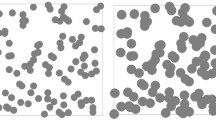Abstract
We consider the min-max r-gathering problem described as follows: We are given a set of users and facilities in a metric space. We open some of the facilities and assign each user to an opened facility such that each facility has at least r users. The goal is to minimize the maximum distance between the users and the assigned facility. We also consider the min-max r-gather clustering problem, which is a special case of the r-gathering problem in which the facilities are located everywhere. In this paper, we study the tractability and the hardness when the underlying metric space is a spider, which answers the open question posed by Ahmed et al. [WALCOM’19]. First, we show that the problems are NP-hard even if the underlying space is a spider. Then, we propose FPT algorithms parameterized by the degree d of the center. This improves the previous algorithms because they are parameterized by both r and d. Finally, we propose PTASes to the problems. These are best possible because there are no FPTASes unless P = NP.
Access this chapter
Tax calculation will be finalised at checkout
Purchases are for personal use only
Similar content being viewed by others
Notes
- 1.
This version of the problem is originally called the r-gather clustering problem [1].
- 2.
Ahmed et al. [2] called this metric space “star.” In this paper, we followed https://www.graphclasses.org/classes/gc_536.html, a part of Information System of Graph Classes and their Inclusions (ISGCI).
- 3.
References
Aggarwal, G., et al.: Achieving anonymity via clustering. ACM Trans. Algorithms 6(3), 49:1–49:19 (2010)
Ahmed, S., Nakano, S., Rahman, M.S.: r-gatherings on a star. In: Das, G.K., Mandal, P.S., Mukhopadhyaya, K., Nakano, S. (eds.) WALCOM 2019. LNCS, vol. 11355, pp. 31–42. Springer, Cham (2019). https://doi.org/10.1007/978-3-030-10564-8_3
Akagi, T., Nakano, S.: On r-gatherings on the line. In: Wang, J., Yap, C. (eds.) FAW 2015. LNCS, vol. 9130, pp. 25–32. Springer, Cham (2015). https://doi.org/10.1007/978-3-319-19647-3_3
Sarker, A., Sung, W., Rahman, M.S.: A linear time algorithm for the r-gathering problem on the line (extended abstract). In: Das, G.K., Mandal, P.S., Mukhopadhyaya, K., Nakano, S. (eds.) WALCOM 2019. LNCS, vol. 11355, pp. 56–66. Springer, Cham (2019). https://doi.org/10.1007/978-3-030-10564-8_5
Armon, A.: On min-max r-gatherings. Theoret. Comput. Sci. 412(7), 573–582 (2011)
Drezner, Z., Hamacher, H.W.: Facility Location: Applications and Theory. Springer (2001)
Han, Y., Nakano, S.I.: On r-gatherings on the line. In: Proceedings of International Conference on Foundations of Computer Science, pp. 99–104 (2016)
Nakano, S.: A simple algorithm for r-gatherings on the line. In: Rahman, M.S., Sung, W.-K., Uehara, R. (eds.) WALCOM 2018. LNCS, vol. 10755, pp. 1–7. Springer, Cham (2018). https://doi.org/10.1007/978-3-319-75172-6_1
Schaefer, T.J.: The complexity of satisfiability problems. In: Proceedings of the tenth annual ACM symposium on Theory of computing, pp. 216–226. ACM (1978)
Sweeney, L.: k-anonymity: a model for protecting privacy. Int. J. Uncertainty, Fuzziness and Knowl.-Based Syst. 10(05), 557–570 (2002)
Author information
Authors and Affiliations
Corresponding author
Editor information
Editors and Affiliations
Rights and permissions
Copyright information
© 2021 Springer Nature Switzerland AG
About this paper
Cite this paper
Kumabe, S., Maehara, T. (2021). r-Gathering Problems on Spiders: Hardness, FPT Algorithms, and PTASes. In: Uehara, R., Hong, SH., Nandy, S.C. (eds) WALCOM: Algorithms and Computation. WALCOM 2021. Lecture Notes in Computer Science(), vol 12635. Springer, Cham. https://doi.org/10.1007/978-3-030-68211-8_13
Download citation
DOI: https://doi.org/10.1007/978-3-030-68211-8_13
Published:
Publisher Name: Springer, Cham
Print ISBN: 978-3-030-68210-1
Online ISBN: 978-3-030-68211-8
eBook Packages: Computer ScienceComputer Science (R0)




